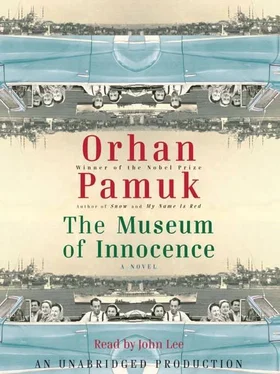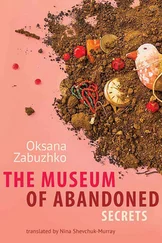A pleasant comment from Füsun at the dinner table at an unexpected moment-for instance, “You went to the barber, I see. He took off a lot but it looks good” (May 16, 1977), or turning to her mother, “He enjoys his meatballs like a little boy, doesn’t he?” (February 17, 1980), or on a snowy evening a year later, when I had just walked in, “We haven’t sat down to eat yet, Kemal. We were just saying how much we all hoped you’d be joining us”-and I would feel so happy, however dark the thoughts I’d brought with me, however discouraging the signs I read as we watched television, that when the time came to leave, I could rise from my chair decisively, retrieving my coat from the hook beside the door, and say, “With your permission, sir, I’ll be off!” Leaving the house in this way I would feel serene as Çetin drove me home early, and I could even think not about Füsun, but about the next day’s work.
A day or two following such a triumph, when I next went to their house for supper and saw Füsun, I would understand with great clarity two of the things that drew me there:
1. When I was far from Füsun, the world troubled me; it was a puzzle whose pieces were all out of place. The moment I saw her, they all fit back together, reminding me that the world was a beautiful, meaningful whole where I could relax.
2. Anytime I entered the house of an evening and our eyes met, it was like a conquest. In spite of everything, and no matter what had happened to dash my hopes and my pride, there was the glory of being here once more, and most of the time I saw the light of the same happiness in Füsun’s eyes. Or so I would believe, and, convinced that my stubbornness, my resolve had made an impression on her, I would find my life’s beauty was restored.
I SPENT New Year’s Eve 1976 playing tombala with the Keskins. Perhaps I remembered this now because I’ve just been speaking about the beauty I’d found in my life. But it is also important, because celebrating the New Year with the Keskins was proof that my life had changed irrevocably. Having broken off with Sibel, I had been obliged to stay away from our circle of mutual friends, and now, visiting the Keskins four or five times a week, I had mostly abandoned my old habits, but until that New Year’s Eve, I would still have myself and those around me believe that I was continuing my old life, or at least that I could return to it whenever I chose.
As for the acquaintances I no longer saw-so as to keep a distance from Sibel, avoid upsetting people with bad memories, and save myself the bother of explaining why I’d disappeared-it was Zaim who kept me abreast of their news. Zaim and I would meet at Fuaye or Garaj or some other society restaurant that had just opened, and there we’d sit having long, pleasant conversations about life and what everyone was up to as intensely as two men discussing business.
Zaim had lost interest in his young girlfriend, Ayşe, who was the same age as Füsun. He told me she was too much of a child, and he couldn’t relate to her troubles or anxieties, nor had she managed to fit in with our group; when I pressed him, he insisted that he had no other girlfriend, or even anyone he was interested in. From what he said, it was clear that Zaim and Ayşe had done no more than kiss, and that the girl would continue to be cautious and prudent so long as her uncertainty about Zaim persisted.
“Why are you smiling?” said Zaim.
“I’m not.”
“Yes, you are,” said Zaim. “But I don’t mind. Let me tell you something you will enjoy even more. Nurcihan and Mehmet meet every day of the week without fail and go from restaurant to restaurant, club to club. Mehmet even takes Nurcihan to gazinos and makes her listen to Ottoman music, all the old songs. They’ve made friends in these places with singers who used to sing on the radio and are now in their seventies and eighties.”
“Are you serious?… I never saw Nurcihan as someone who would go for that sort of thing.”
“All because she fell in love with Mehmet. Actually, Mehmet doesn’t know much about these old singers either. He’s trying to learn it all, just to impress Nurcihan. They go to the Sahaflar Market together to buy old books, and then they trot off to the flea market looking for old records. In the evenings they go to Maksim and the Bebek Gazino to listen to Müzeyyen Senar. But they never get around to listening to the records together.”
“What do you mean?”
“Well, every evening they’re out at the gazinos,” Zaim said carefully. “But they never go anywhere to be alone and make love.”
“How do you know that?”
“Where could they possibly go? Mehmet still lives with his parents.”
“He used to have a place where he took women, in the backstreets of Maçka.”
“He had me over there, for a whiskey,” said Zaim. “It’s a typical garçonnière . Nurcihan is too clever to go near that hideous place; she knows that if she did Mehmet would immediately see it as reason not to marry her. Even I felt strange there: The neighbors were peering through the peephole, to see if this guy had brought back another prostitute.”
“So what should Mehmet do? Do you think it’s easy for a single man to rent an apartment in this city?”
“They could go to the Hilton,” said Zaim. “Or he could buy himself an apartment in a decent neighborhood.”
“Mehmet loves living with his family.”
“You do, too,” said Zaim. “May I say something to you as a friend? But promise me you won’t get angry.”
“I won’t get angry.”
“Instead of meeting secretly at the office, as if you were doing something wrong, you should have taken Sibel to the Merhamet Apartments, where you took Füsun; then you two would still be together.”
“Did Sibel say that?”
“No, my friend. Sibel doesn’t talk about such things with just anyone,” said Zaim. “Don’t worry.”
For a time we were silent. We’d been having so much fun gossiping, but then suddenly it upset me to have my life discussed as if I’d suffered some sort of catastrophe. Zaim noticed that my spirits had fallen, so he told me about how he’d run into Mehmet, Nurcihan, Tayfun, and Faruk the Mouse all sitting together at a soup shop in Beyoğlu late one night.
Zaim may have been recounting this in the hope of luring me back into my old life, but he also enjoyed reporting all the fun he was having; I listened to him go on in detail, often exaggerating, but I didn’t pay it much mind until later in the evening, when I was at the Keskins’ and I caught myself reflecting fondly on such outings. But let no one imagine that I was grieving my lost friends or my days of prowling the city. It was just that sometimes at the Keskins’ dinner table it would suddenly seem to me that nothing was happening in the world, or if something was happening we were far away-that’s all.
On the night we ushered in 1977 I must have succumbed to such a feeling, because I remember a point when I wondered what Zaim, Sibel, Mehmet, Tayfun, Faruk the Mouse, and all the rest were doing. (Zaim had installed electric heaters in his summer house and had dispatched the caretaker to light a fire for a big party to which he had invited “everyone.”)
“Look, Kemal, twenty-seven’s come up, and you have one on your card!” said Füsun. When she saw I wasn’t paying attention, she put a dried bean on the 27 on my tombala card, and smiled. “Stop messing around and play the game!” she said, for a moment looking into my eyes with concern, anxiety, and even tenderness.
It was for just this sort of attention from Füsun that I was going to the Keskin house. I felt an extraordinary happiness, but it hadn’t been easy to achieve. Not wanting to upset my mother and my brother, I hid my plans for spending New Year’s Eve at the Keskins’ by eating supper at home with them. Afterward Osman’s sons-my nephews-had cried, “Come on, Grandmother, let’s play tombala!” so I was obliged to play a round with them. While we were all playing, I came eye to eye with Berrin, and perhaps she, too, was struck by the pretense of this happy family tableau, because I remember that she raised her eyebrows, as if to say, “Nothing wrong, I hope?”
Читать дальше












